
CHINA OCEAN ENGINEERING
Scope & Guideline
Pioneering Research at the Intersection of Ocean and Engineering
Introduction
Aims and Scopes
- Hydrodynamic Analysis and Modeling:
The journal addresses hydrodynamic phenomena through numerical and experimental simulations, focusing on the interactions between waves, currents, and marine structures. - Offshore Renewable Energy Systems:
Research on offshore wind turbines, wave energy converters, and hybrid energy systems is a core focus, aiming to optimize energy extraction and efficiency in marine environments. - Structural Integrity and Safety Assessments:
The journal publishes studies on the mechanical performance and failure modes of marine structures, including pipelines, foundations, and floating platforms under various environmental loads. - Environmental and Ecological Engineering:
Research related to the environmental impacts of marine engineering projects, including sediment transport, biofouling prevention, and sustainable design practices. - Numerical and Experimental Methods:
A strong emphasis on innovative computational techniques and experimental methodologies for analyzing marine engineering challenges, including fluid-structure interaction and dynamic response analysis.
Trending and Emerging
- Smart and Autonomous Marine Systems:
Increasing research on autonomous underwater vehicles (AUVs) and smart marine systems highlights the trend towards automation and intelligent systems in ocean engineering. - Hybrid Energy Solutions:
A growing focus on hybrid energy systems that combine wind, wave, and other renewable energy sources is evident, driven by the need for sustainable energy solutions in offshore environments. - Climate Resilience and Adaptation:
Research addressing the resilience of marine structures to climate change impacts, including increased storm intensity and sea-level rise, is becoming increasingly prominent. - Advanced Materials and Construction Techniques:
There is a notable trend towards the development and application of new materials and innovative construction methods to enhance the performance and longevity of marine structures. - Data-Driven Approaches and AI in Marine Engineering:
The integration of artificial intelligence and machine learning techniques in marine engineering research is expanding, particularly in predictive maintenance and optimization of marine systems.
Declining or Waning
- Traditional Marine Structures:
Research on conventional marine structures such as fixed piers and docks has decreased, possibly due to a shift towards more innovative and flexible solutions like floating structures. - Static Marine Engineering:
There is a noticeable decline in studies focused on static analysis of marine structures as the field increasingly emphasizes dynamic responses and adaptability. - Conventional Wave Energy Conversion:
The exploration of traditional wave energy conversion technologies appears to be waning, with a shift towards more advanced hybrid systems and novel technologies. - Marine Pollution Control Technologies:
Fewer papers are being published on conventional technologies for marine pollution control, indicating a potential shift towards integrated environmental management approaches. - Ice Interaction Studies:
Research specifically addressing the interactions of marine structures with ice has diminished, potentially due to the focus on other pressing engineering challenges in warmer climates.
Similar Journals
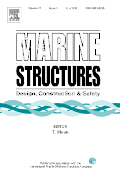
MARINE STRUCTURES
Pioneering Research in Marine StructuresMARINE STRUCTURES, published by Elsevier Science Ltd, is a premier scholarly journal that has established itself as an essential platform for the dissemination of cutting-edge research in the fields of Marine Engineering, Ocean Engineering, and Materials Science. With an impressive H-index reflecting its substantial citation impact, and boasting a Q1 ranking across several categories including Materials Science and Mechanical Engineering as of 2023, this journal is recognized globally for its contributions to advancing knowledge and innovation in marine structures. The journal covers a wide range of topics, from the design and analysis of marine structures to the latest technologies and methodologies in ocean engineering, making it invaluable for researchers, professionals, and students alike. As the journal continues to publish high-quality articles that explore contemporary challenges and opportunities within the marine domain, it serves as a catalyst for collaboration and knowledge exchange among academia and industry. Researchers are encouraged to submit their original works and benefit from the rigorous peer-review process that ensures the quality and reliability of published content. MARINE STRUCTURES is not currently an open access journal, providing a subscription-based model that facilitates access to its authoritative body of knowledge.
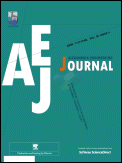
Alexandria Engineering Journal
Shaping the future of engineering with cutting-edge insights.Alexandria Engineering Journal is a premier open access publication dedicated to advancing the field of engineering. Published by ELSEVIER and headquartered in Amsterdam, the Netherlands, this journal has been at the forefront of disseminating innovative research since its inception in the year 2000. With its impressive Q1 ranking within the Engineering (miscellaneous) category and a notable position as #20 out of 307 in the Scopus rankings, it serves as a vital resource for scholars and practitioners alike, ensuring that cutting-edge findings reach a global audience. The journal is accessible to all since adopting open access policies in 2010, thereby facilitating the sharing of valuable insights without barriers. As we approach the convergence of years from 2000 to 2024, the Alexandria Engineering Journal continues to play a pivotal role in shaping engineering practices and underpinning significant advancements in the field.
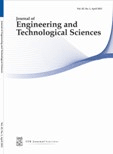
Journal of Engineering and Technological Sciences
Advancing Engineering Excellence GloballyJournal of Engineering and Technological Sciences, published by ITB JOURNAL PUBL, is a prominent open-access journal dedicated to advancing knowledge in various engineering disciplines and applied sciences. With an impact factor that highlights its growing influence, this journal supports a broad scope of topics, including Chemical Engineering, Civil and Structural Engineering, Earth-Surface Processes, Environmental Science, and Materials Science, as well as Mechanical Engineering. The journal has been sharing impactful research since 2013 and continues to bridge gaps between theory and practical application within the engineering community. Leveraging its Q2 and Q3 category quartile rankings in key engineering fields and solid standings in Scopus rankings, it provides a vital platform for researchers, practitioners, and students alike. Based in Indonesia, at the LPPM ITB Rectorate Building in Bandung, the journal emphasizes global contributions and innovations in engineering, making it an essential resource for cutting-edge research worldwide.

INTERNATIONAL JOURNAL OF OFFSHORE AND POLAR ENGINEERING
Advancing Knowledge in Extreme EnvironmentsINTERNATIONAL JOURNAL OF OFFSHORE AND POLAR ENGINEERING, published by the International Society of Offshore and Polar Engineers, is a prominent academic journal dedicated to advancing research in key engineering disciplines such as Civil, Mechanical, and Ocean Engineering. Established in 1991, the journal caters to a global audience, providing an essential platform for disseminating innovative findings and case studies pertinent to offshore and polar environments. With a focus on practical and theoretical applications, the journal ranks in the Q3 category across its relevant fields as of 2023, reflecting its significant contribution to civil and structural engineering, mechanical engineering, and ocean engineering. Although it does not offer open access, its rigorous peer-review process ensures that only high-quality research is published, making it a critical resource for researchers, industry professionals, and students invested in the dynamics of offshore and polar engineering. The journal's commitment to exploring emerging challenges and technological advancements underlines its importance in shaping the future of engineering practices in some of the world's most extreme environments.
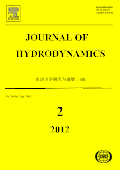
Journal of Hydrodynamics
Exploring the Depths of Hydrodynamic InnovationWelcome to the Journal of Hydrodynamics, a premier academic journal dedicated to pioneering research in the fields of Condensed Matter Physics, Mechanical Engineering, Mechanics of Materials, and Modeling and Simulation. Published by Springer, this esteemed journal has been a vital resource since its inception in 1990 and boasts a notable Q1 ranking across its relevant categories, underscoring its importance in advancing knowledge and innovation. With a robust Scopus ranking reflecting its impact—such as being in the 82nd percentile in Mathematics: Modeling and Simulation and the 75th percentile in various engineering disciplines—the journal serves as a critical platform for researchers, professionals, and students. While not currently an open-access publication, the Journal of Hydrodynamics remains committed to fostering scholarly dialogue and disseminating high-quality research that shapes the future of its field. Our mission is to provide a comprehensive forum for the discussion of theoretical and applied hydrodynamics, potentially influencing both academic inquiry and practical applications worldwide.

International Journal of Multiphysics
Advancing Engineering Through Multiphysical InsightsWelcome to the International Journal of Multiphysics, a pioneering platform dedicated to the expansive field of multiphysics and its applications across various engineering disciplines. Published by MULTI-SCIENCE PUBL CO LTD since 2007, this Open Access journal plays a crucial role in disseminating innovative research findings that advance our understanding of complex interactions in multiphysical phenomena. With its ISSN 1750-9548, the journal has made significant contributions within its converged years from 2010 to 2024, offering insights into Computational Mechanics, Fluid Flow, Mechanical Materials, and Numerical Analysis with a current classification in the Q4 Quartile across multiple relevant categories. Researchers, professionals, and students will find valuable information and cutting-edge studies by accessing the journal from the United Kingdom, and thus contribute to ongoing dialogues in these critical areas of study. The International Journal of Multiphysics represents an essential resource for those aiming to innovate and enhance our knowledge of interactive systems in engineering and applied sciences.
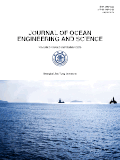
Journal of Ocean Engineering and Science
Pioneering interdisciplinary approaches to ocean challenges.The Journal of Ocean Engineering and Science, published by Elsevier, is a prominent academic journal dedicated to advancing the field of ocean engineering and environmental sciences. Since its inception as an Open Access journal in 2016, it has rapidly gained recognition, achieving significant impact factor ratings with notable placements in the prestigious Q1 category for Ocean Engineering and Oceanography, and Q2 for Environmental Engineering in 2023. With a remarkable ranking of #3 out of 105 in Ocean Engineering and #4 out of 145 in Oceanography according to Scopus, the journal plays a critical role in disseminating cutting-edge research and innovative solutions addressing complex challenges faced by marine environments. Operating from Amsterdam, Netherlands, the Journal of Ocean Engineering and Science invites contributions from researchers, professionals, and students worldwide, emphasizing the importance of interdisciplinary approaches in achieving sustainable maritime practices.
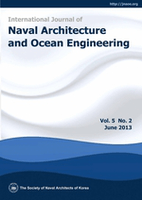
International Journal of Naval Architecture and Ocean Engineering
Shaping the waves of naval architecture with cutting-edge insights.International Journal of Naval Architecture and Ocean Engineering is a premier academic journal dedicated to advancing the fields of naval architecture and ocean engineering. Published by the SOC NAVAL ARCHITECTS KOREA, this Open Access journal has been a vital resource for researchers and industry professionals since its founding in 2009, providing unrestricted access to high-quality, peer-reviewed articles. With a notable Q2 ranking in both Control and Systems Engineering and Ocean Engineering, it ranks among the top journals in its category, offering valuable insights into emerging technologies and methodologies. The journal’s reputation is further highlighted by its Scopus rankings, positioning it within the top 30% of journals in Ocean Engineering and the top 31% in Control and Systems Engineering as of 2023. Based in the vibrant academic hub of Seoul, South Korea, the journal invites manuscripts that explore innovative solutions and critical research to address the challenges in naval and oceanic environments, contributing to the global dialogue on sustainable maritime practices.

International Journal of Engineering Research in Africa
Elevating African Engineering Research GloballyThe International Journal of Engineering Research in Africa is a pivotal academic resource for researchers, professionals, and students interested in the multifaceted field of engineering within the African context. Published by TRANS TECH PUBLICATIONS LTD, this journal facilitates the dissemination of innovative research, covering a myriad of topics in engineering, from advanced materials to sustainable practices. With an ISSN of 1663-3571 and E-ISSN 1663-4144, this publication not only fosters scholarly communication but also contributes to the global engineering discourse, as evidenced by its current Q3 ranking in the Engineering (miscellaneous) category in 2023. Operating from its base in Switzerland, the journal has been actively publishing since 2010 and continues to play a vital role in the advancement of engineering knowledge, particularly in the African landscape. Although it does not offer an open access model, the journal's commitment to quality research ensures that it remains a valuable asset for those seeking to understand and innovate within the engineering sector. Its integration in Scopus with a rank of #175 out of 307 in General Engineering further underscores its relevance and impact in the engineering community.
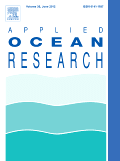
APPLIED OCEAN RESEARCH
Fostering Excellence in Marine Technology ResearchApplied Ocean Research, published by Elsevier Scientific Ltd, stands as a premier journal in the field of ocean engineering, with an impressive impact factor derived from its esteemed reputation and contributions to the discipline. Having been established in 1979, the journal has continually provided a platform for groundbreaking research, fostering innovation and advancement in applied ocean science through a diverse array of topics, including marine technology, coastal engineering, and ocean energy. Currently holding a prestigious Q1 ranking in the Scopus category of Ocean Engineering, with a rank of 10 out of 105 and a notable 90th percentile, Applied Ocean Research is a vital resource for researchers, professionals, and students dedicated to understanding and solving complex challenges linked to ocean environments. Although it provides subscription-based access, the depth and quality of research featured make it a key reference point for those in academia and industry alike. Located in the heart of London, this journal embodies a commitment to excellence in the study of ocean phenomena, positioning itself as a critical conduit for knowledge dissemination and professional growth in this dynamic field.